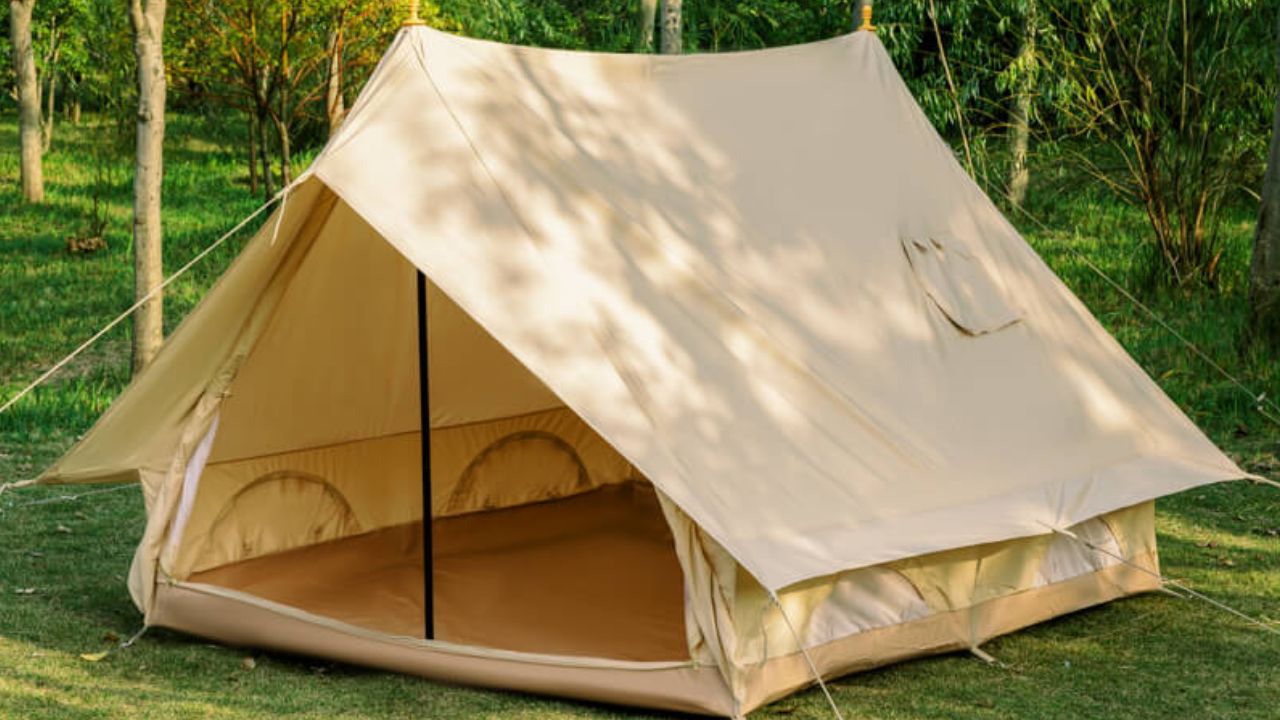Choosing the appropriate tent fabrics is very important for outdoor excursions or luxury camping to offer comfort, defense, and strength. The waterproof tent fabric is of crucial importance to campers so they can stay dry and safe despite any weather conditions.
The use of each material, from lightweight synthetic materials to heavier mixtures, has its advantages. China luxury tent wholesale manufacturers are a great option for those who demand quality and innovation, along with a range of other options.
This article covers waterproof tent materials used in tent making so keep reading to know the details.
Waterproof Tent Materials Used In Their Manufacturing
Here are the top waterproof tent materials used for the manufacture of high-quality tents.
1. Polyester Fabric
Polyester fabric is one of the most frequently used materials in the production of waterproof tents because of its light weight, resistance, and low cost. Because of its synthetic fiber nature, polyester particles between the fibers have small gaps and it can allow water to seep in.
To combat this, manufacturers coat the fabric with a silicone or polyurethane layer, making it waterproof and ensuring excellent water repellency.
Almost all pop-up and backpacking tents are constructed from this material as this material adheres to the need for functionality and portability. Polyester is also rapidly wicking and thus the right material for wet outdoor activities and gets longer service life even if under UV radiation.
2. Poly-Cotton Fabric
Poly-cotton fabric is a blend of plant-origin cotton and synthetic polyester fiber, so the strong features of each material are combined. This blend improves durability, reduces weight compared to traditional canvas, and enhances resistance to mildew. To render poly-cotton tents watertight, manufacturers coat them with special waterproof coatings that are water-repellant. Although poly-cotton is water-repellent, breathability is maintained by providing less internal condensation in the tent. With excellent durability, it is a perfect choice for long-term stay camping or semi-permanent housing, but with the bulkiness and high cost, it is not a good choice for casual campers. The robust construction guarantees longevity in challenging weather conditions.
3. Oxford Fabric
Oxford fabric is a versatile and innovative material known for its durability and water resistance. Fabricated by a special weaving process, the collagen fibers are stacked and hooked into a staggered square, and its very structure is dense for the strength and anisotropy of the fabric. To enhance its waterproof properties, Oxford fabric is coated with polyurethane (PU) or polyvinyl chloride (PVC). This gives it an extreme resistance to water penetration, up to a strength and wear resistance. Oxford fabric is the best suited for tents provided in the harshest conditions; it is invariant to chemicals, abrasion, and abuse. Because of its stability and robustness, it is a worthwhile option for camping, as well as factory tents, etc.
4. Nylon Fabric
Nylon is a stiff, light, and firm material that is commonly utilized in tent fabrication with a strong focus on backpacking and hiking tents. To provide waterproofing, nylon fabric is silicone, polyurethane, or polyurethane silicone coated, and it provides a water-resistant barrier preventing leakage during storm rain.
Not only does this coating provide greater resistance to radiation effects caused by UV exposure, but it also increases the lifespan of the shelter in the presence of sunlight. The strength-to-weight ratio of nylon makes it ideal for portable tents that are used without compromising performance.
It is, however, a combustible material, so extra precautions should be taken not to bring it close to a campfire or open flames while in use.
Key Factors to Consider When Choosing Waterproof Tent Materials
1. Durability and Strength
For the selection of waterproof tent fabrics, durability is an important criterion as it reflects the fabric's resistance to abrasion in extreme outdoor environments. Materials like nylon and Oxford fabric are known for their high strength and resistance to abrasions.
Durability guarantees the tent is tough enough for rough areas, high winds, and wet weather without shredding or degrading. For repeat campers or prolonged use outdoors, the investment in tougher materials with reinforced coatings is necessary to provide long-term and stable duration in extreme weather.
2. Weight and Portability
The weight of the tent fabric is very important, particularly for backpackers or hikers who are searching for lightweight tents to be portable. Fibers such as polyester, nylon, etc., are ideal as they are light yet strong.
Although more robust alternatives such as poly-cotton are better for both protection and ventilation, they are not so convenient for traveling because they are too thick. Balancing weight with functionality allows users to choose the right tent material based on their camping style, whether for short hikes or extended outdoor adventures.
3. UV Resistance
In the selection of waterproof tent materials, UV resistance is an important factor in ensuring the lifetime of the tent. If fabrics are exposed chronically to sunlight, they can be weakened, and their waterproof function will degrade over time.
Materials such as nylon and polyester are typically supplied with UV-protective coatings that shield from harmful rays and thus extend tent durability for use in various outdoor conditions. For luxury tents, UV protection is a performance determinant while contributing to the integrity of the material, which is a decisive factor for outdoor users.
Conclusion
Selecting an appropriate waterproof tent fabric can be the key to a comfortable, trouble-free day outdoors. With the resilience of nylon and the toughness of Oxford cloth, each offers features of particular usefulness in particular contexts. Factors such as weight, durability, and waterproofing capabilities should guide your decision to find the ideal solution for your camping needs. Through this understanding of these materials, outdoor recreationists and businesses can still produce robust, functional, and weatherproof tents that offer high value and performance for every adventure.


